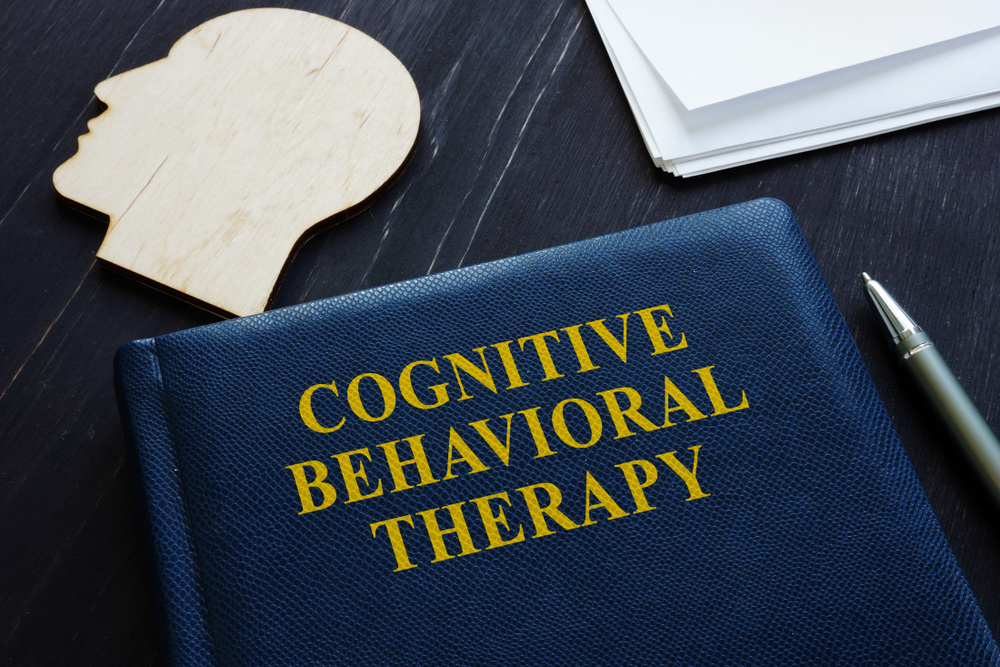Last Updated:
September 18th, 2025
What is CBT?
Cognitive Behavioural Therapy (CBT) is one of the most widely used and researched forms of therapy today. At its core, CBT is based on a simple but powerful idea: the way we think influences the way we feel and behave. If we can identify and change the unhelpful thoughts that keep us stuck, we can start to change how we respond to the world around us.
CBT is structured, goal-focused, and typically short to medium term. It doesn’t ask you to lie on a couch and dig endlessly into your past, instead, it focuses on what’s happening now and what can be done to move forward. Sessions are practical and collaborative, with you and your therapist working together to develop strategies that help tackle everyday challenges.
Because of its flexibility and proven effectiveness, CBT is used to treat a wide range of issues. It’s often recommended for anxiety, depression, phobias, obsessive-compulsive disorder, eating disorders, and, crucially, addiction.
How does CBT work for treating addictions?
Therapy can sometimes feel like a bit of a mystery. You’re told it can help, but you’re not exactly sure how and then you’re expected to trust the process, often in front of someone you’ve only just met. That uncertainty can feel unnerving.
In some ways, it’s like the fear of flying. For many people, the anxiety isn’t just about being in the air; it’s about not understanding how the plane works, what keeps it up there, or what the pilot’s actually doing. You’re putting your life in someone else’s hands, hoping they know what they’re doing. But if someone took the time to explain, in simple terms, how it all works, then perhaps the fear might ease a little.
That’s what we want to do with CBT. Below, we break down the structure CBT often follows in addiction recovery, so you can feel more confident about what to expect and how it actually helps.
1. Laying the groundwork
- You’ll learn how your thoughts, emotions, and behaviours are linked—and how this cycle keeps you stuck in addiction.
- Together with your therapist, you’ll explore why you want to change and set goals that actually mean something to you.
- You’ll look closely at the situations, emotions, and thought patterns that lead you to use, so you can start to understand what’s really driving it.
2. Building your recovery skills
- You’ll track your daily experiences to spot triggers and patterns.
- You’ll learn techniques to handle cravings and urges when they show up.
- You’ll practise saying no in social settings, and develop healthier ways to communicate and manage stress.
- You’ll also be encouraged to find new, rewarding activities that can take the place of using.
3. Planning for the long haul
- Once you’ve made progress, you’ll create a plan to stay on track—even when things get tough.
- You’ll also look at the people in your life who can support your recovery and keep you moving forward.
How efficient is CBT in addiction recovery?
Once again, we find ourselves being told that something works, without always being shown the proof when it comes to therapy, especially during something as personal and life-altering as addiction recovery, which can leave you feeling uneasy.
We’re back on the plane again, staring out the window, wondering whether the pilot, who’s flown thousands of times before, has actually landed any of them safely. It’s obvious the pilot has, but some feel a little more reassured in reading those proof-in-the-pudding flight logs.
Well, that’s what we’re here to do with CBT.
Below, we take a look at a 2023 meta-analysis that dug deep into decades of research to see just how effective CBT really is for addiction recovery. The findings offer real reassurance that CBT can help, and has helped, people in situations just like yours.
CBT consistently helps people reduce or stop using substances
Across the board, CBT helped people cut back or stop their use of alcohol, cannabis, cocaine, opioids, and other substances. This wasn’t just a temporary fix either. The improvements were seen in reduced frequency and quantity of use, better emotional regulation, and stronger social functioning.
In short, people who engaged with CBT tended to do better overall. For anyone feeling stuck or unsure where to turn, this kind of clarity in the data can offer real hope.
It’s especially effective when compared to doing nothing
When researchers compared CBT to groups receiving no treatment or only very basic support, the difference was clear. CBT was far more effective at helping people stay abstinent and avoid relapse. If you’ve ever felt like you’re just spinning your wheels or waiting for change to happen on its own, CBT can offer structured, evidence-based steps forward. It replaces guesswork with tools that actually work.
When paired with other therapies, the impact of CBT can grow even stronger
CBT plays well with others. When combined with therapies like motivational interviewing or contingency management, results often improved. Early engagement went up, treatment outcomes were better, and people were more likely to stick with recovery long-term. So if you’ve tried therapy before and it didn’t quite land, CBT might bring out the best in a combined approach.
Medication and CBT together create a powerful combination
For people recovering from alcohol or opioid addiction, where medication may already be part of the plan, CBT adds real value. In fact, the studies showed that when CBT was layered on top of medication, people experienced greater reductions in use and improved outcomes overall. It’s not a case of either/or. It’s about strengthening your recovery from every angle.
Digital CBT can work, too
If the idea of sitting in a therapist’s office feels overwhelming, there’s good news: CBT also works in digital formats. People using online CBT, especially when paired with usual care, still saw meaningful reductions in substance use. It might not replace the full benefits of in-person sessions, but it’s a great step forward if accessibility, privacy, or time is an issue. Help doesn’t always have to come in a traditional form.
We’re still uncovering how CBT works, but we know that it does
One of the most fascinating parts of this research is that CBT’s exact inner workings are still being explored. But there are clues. Things like learning how to cope with triggers, rebuilding your confidence, and managing cravings all appear to play a role. If therapy has ever felt vague or abstract to you, CBT might be a breath of fresh air in its clarity and structure.
Does UKAT use CBT in their addiction recovery programmes?
If you’re struggling with addiction, reaching out might feel daunting but it can also be the moment everything starts to change. At UKAT, therapies like CBT are a cornerstone of our recovery programmes, helping to uncover the patterns and triggers that keep addiction in place. But therapy is just one part of the journey.
Our programmes are designed to support every aspect of your recovery, from physical detox to long-term relapse prevention. Whether this is your first time seeking help or you’ve tried before, you’ll be met with care, structure, and a team who genuinely wants to see you succeed.
Contact us today and take that first step toward a life beyond addiction.
(Click here to see works cited)
- Magill M, Kiluk BD, Ray LA. Efficacy of Cognitive Behavioral Therapy for Alcohol and Other Drug Use Disorders: Is a One-Size-Fits-All Approach Appropriate? Subst Abuse Rehabil. 2023 Feb 19;14:1-11. doi: 10.2147/SAR.S362864. PMID: 36844999; PMCID: PMC9948631.





